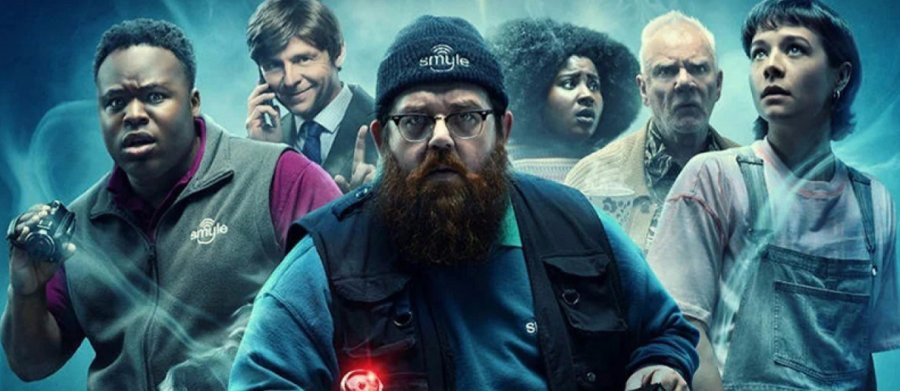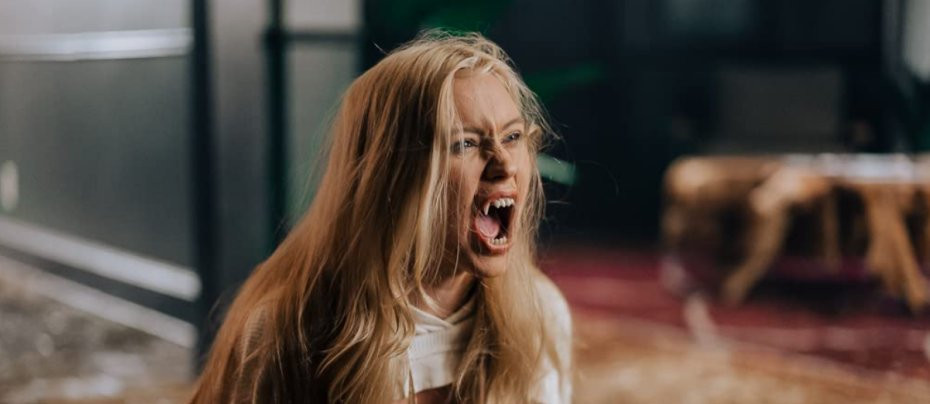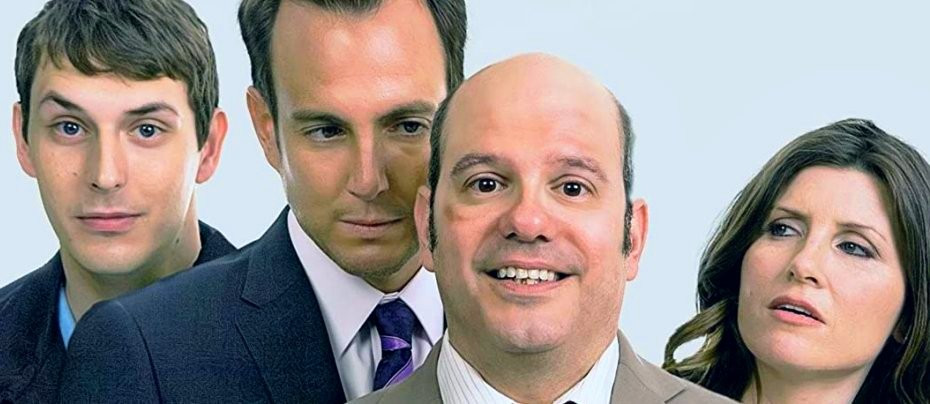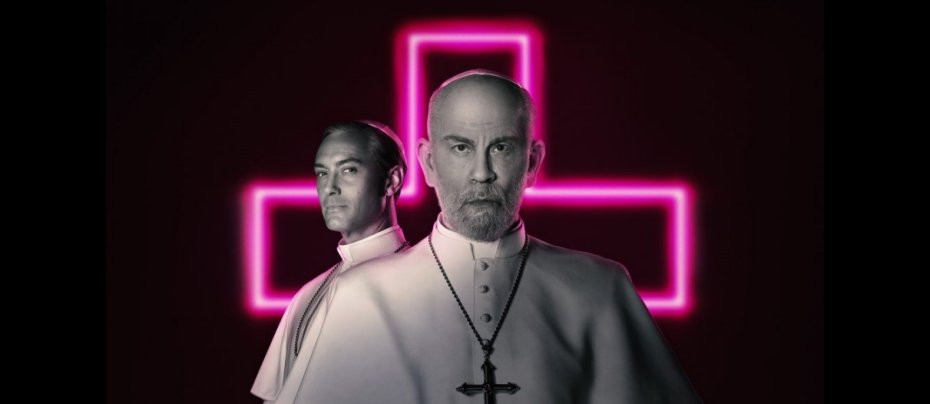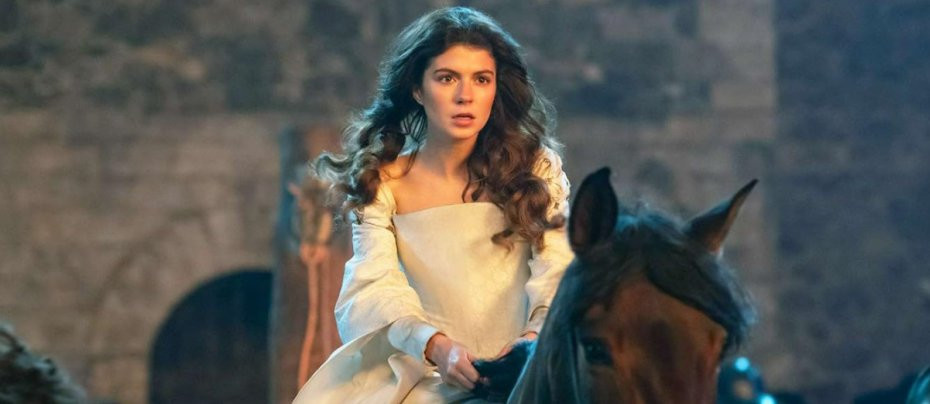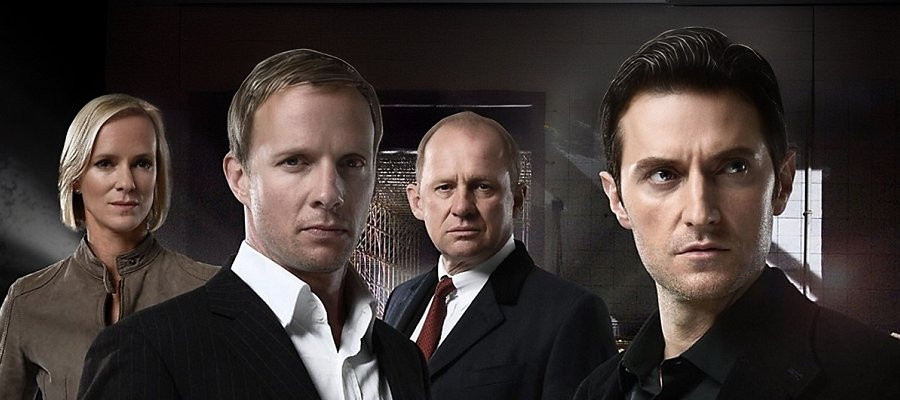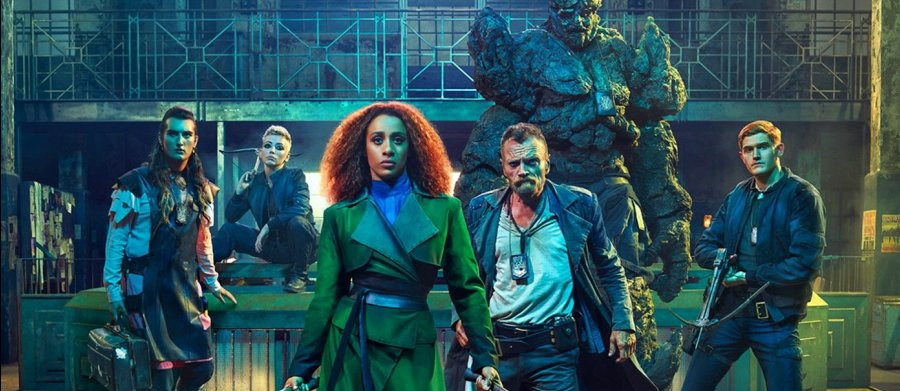
The Watch
2020 - United KingdomThe first thing to accept, going into The Watch, is that it's not Discworld. It's “inspired by the Discworld novels by Sir Terry Pratchett,” with “inspired” seemingly TV talk for “we've changed it so much we can't even say 'based on.'” A point of comparison might be The Irregulars: if you can accept that it's got very little to do with Sherlock Holmes, in spite of being based upon it, then you'll probably enjoy it, while still wondering why they didn't just make it its own thing.
The problem with this approach is that the Sherlock Holmes stories have been adapted, expanded upon and pastiched dozens of times over the last hundred-odd years. There's room to play around with it and do new and controversial things. The Discworld series – Pratchett's beloved run of forty-one novels, plus a few short stories and sundry extras – has only had a handful of screen adaptations before. The first attempt was Cosgrove Hall's animated adaptations for Channel 4 in the 1990s, beginning with the very short Welcome to the Discworld which adapted a fragment of the novel Reaper Man, as a sort of test piece, before continuing with the faithful, and thus rather long, animated serials of Wyrd Sisters and Soul Music. Between 2006 and 2010, Sky One and production company The Mob produced three miniseries/TV movies with varying degrees of success, based on Hogfather, The Colour of Magic (also incorporating its sequel, The Light Fantastic) and Going Postal, the last of which really nailed it. There have since been some semi-official shorts by Snowgum Films: Run, Rincewind, Run! and Troll Bridge, the latter of which is easily viewable on YouTube and is very good.
There seems little point, then, in extensively altering the concepts for the latest adaptation. There's no point subverting the norm when there's no norm to subvert. Understandably, a number of the novels' devoted fans have been appalled by the changes made to the underlying material for this series, and so find themselves unable to enjoy it. Some of the changes made are understandable, some laudable, some inexplicable. Fundamentally, The Watch just doesn't feel like Discworld, an admittedly very nebulous concept but one that is vital in making an adaptation work. Which is a shame, because taken on its own terms, as a subversive, punky urban fantasy series, The Watch largely works; it just doesn't work as a Discworld series.

The series is primarily written by Simon Allen, with Catherine Tregenna, Joy Wilksinson, Amrou Al-Kadhi and Ed Hime also contributing to the scripts (some of which may be familiar names to Doctor Who and Torchwood viewers). Early news on the series, from Pratchett's company Narrativia, had Terry Jones pegged as the main writer, which unfortunately never came to fruition due to his illness. Several other writers came and went, including Rhianna Pratchett, the author's daughter and heir to the intellectual property, but eventually it arrived under Allen's control. BBC Studios produced it with Narrativia for BBC America, before it finally arrived in the UK on the iPlayer service. There's an undoubted American influence on the series, although the casting remains mostly British.
The Watch draws on the Ankh-Morpork City Watch, the police force of the main setting of the Discworld books, in the great, grimy city of Ankh-Morpork. First appearing in 1989's Guards! Guards!, and since starring in a further seven novels, with minor appearances in many more, the Watch are led by Sam Vimes, a decent but cynical old school copper, with varied members through the years but a few core characters throughout. The novels are paraprocedurals, investigating crimes in the fantastic environment of Ankh-Morpork and sometimes the wider Discworld. The Watch takes this as the basic starting point, taking on Vimes and certain other characters, and twisting it all to its own vision. The core of the story for the six episodes is drawn from Guards! Guards! and the later novel Night Watch, with elements taken from various other Discworld works.
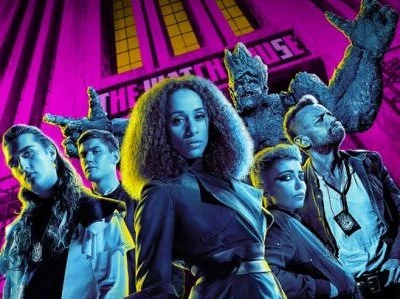
While Ankh-Morpork and the Discworld itself don't belong to any particular historical era, there's a general period feel to all of it, with the novels straddling a mediaeval fantasy setting to a late Victorian, Industrial Revolution urban fantasy, covering everything in between. The series, however, has gone for a deliberately punk-influenced, neon-lit aesthetic, and the technology on display, in spite of being magical in nature, looks a lot more modern than even the latest novels suggested. You could believe that this actually followed on from the novel series, taking place after a few decades more development. The novels' Ankh-Morpork has just developed steam power, but in the series there's clearly some form of electricity. Still, some things are dead right: security cameras house tiny imps who paint what they see, and who can be bribed.
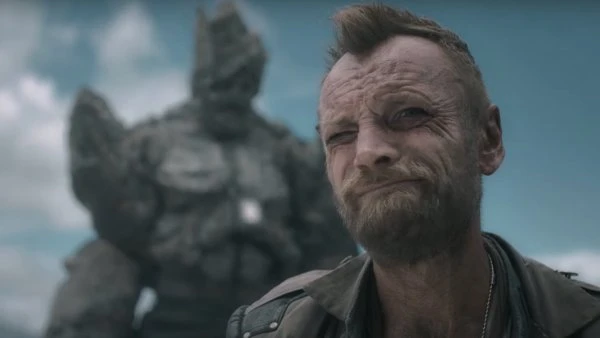
Much of the controversy comes from the casting, which is a mixed bag, and again, how much you'll like it depends on how much deviation you can take from the source material. Every reader has their own image of Vimes, the central character of the series, but I imagine quite a few of them looked something like the grizzled Richard Dormer. The Northern Irish actor, known for Game of Thrones and Fortitude, gives a performance that's a little to over-the-top and gurny for my tastes, but he works as a flawed leading man with a chip on his shoulder and a drinking problem. Vimes was from the wrong end of the city, the area called the Shades, and was part of a street gang in his youth, something the series focuses upon heavily.
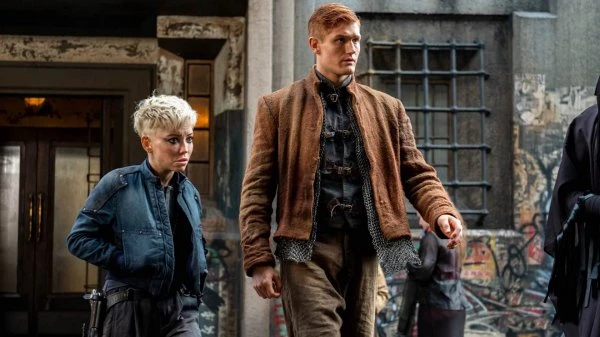
The remainder of the Watch include Carrot Ironfoundersson, an adoptive dwarf, the main joke from the books being that he's over six feet tall and built like a brick privy. This falls flat on screen, as in this version dwarfs seem to regularly be rather tall. Possibly the heir to the deposed Morporkian throne, Carrot is a young, idealistic, and enthusiastic policeman, played with upstanding decency by Adam Hugill (1917, World on Fire). He joins Corporal Angua von Uberwald, a werewolf, played by Maltese actress Marama Corlett (Blood Drive); Corporal Cheery Littlebottom, an actual (but tall) dwarf, played by Jo Eaton-Kent (Don't Forget the Driver); and Sergeant Detritus, an enormous, rock-based troll, played by Ralph Ineson (Waterloo Road, The Office, Game of Thrones), whose Yorkshire tones are immediately recognisable from beneath the costume. Of these, Eaton-Kent's casting is perhaps the most interesting. In the novels, Cheery is a female dwarf, hard to tell under her obligatory beard; here she's shaved her beard and is openly female from the outset. Casting a non-binary actor in the role is an obvious idea, in hindsight, and makes the character's rebellion against her tradition-bound culture explicitly a trans allegory. It also helps that Eaton-Kent is charming and adorable in the role.
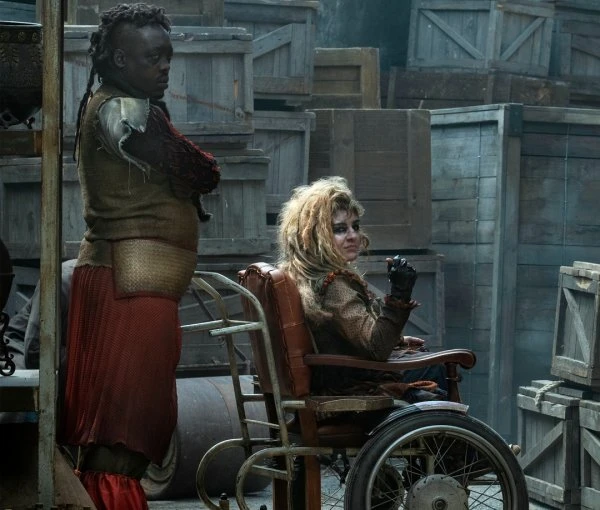
Several of the characters are cast in unexpected ways, with gender or race changed from the novels (although the books generally feature relatively little physical description and race isn't such a big deal in a city where multiple sentient species intermingle). Hakeem Kae-Kazim (Hotel Rwanda, Black Sails) appears as John Keel, Vimes's predecessor as Captain of the Watch; Ruth Madeley (Years and Years, The Rook) is a little underutilised as Throat, the considerably altered screen version of spiv Cut-Me-Own-Throat Dibbler; James Fleet (The Vicar of Dibley) is spot-on as the Archchancellor of Unseen University, the seat of wizardry in the city. Ingrid Oliver (Watson & Oliver, Doctor Who) is sinister as Dr. Cruces, the head of the Assassin's Guild, Paul Kaye (The Sunday Show, Game of Thrones) is her snivelling underling Inigo Skimmer, and Joe Vaz is the master thief Urdo van Pew.
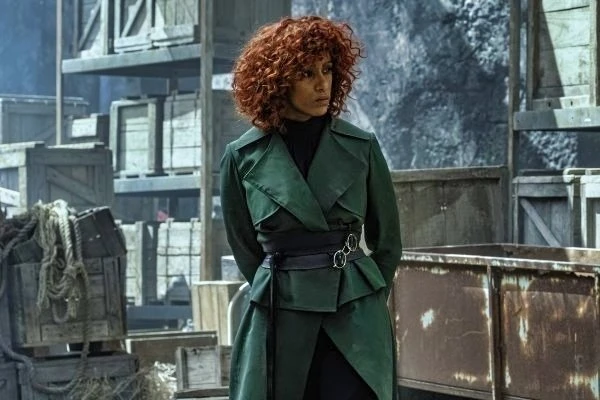
Some of the more unexpected casting includes that of Lord Vetinari, the Patrician of Ankh-Morpork, and Lady Sybil Ramkin, the dragon-keeping noblewoman who is destined to become Mrs Sam Vimes. Vetinari, a male character in the books, is played by Anna Chancellor (Kavanagh QC, The Hour) casting that sounded promising on paper, but who doesn't have the ruthless gravitas needed for the tyrant. Lara Rossi (Crossing Lines, I May Destroy You) is excellent as Sybil, a character who has been extensively reworked from the books into a gung-ho, anti-establishment figure who's still upper-class and landed. It's a major change but Rossi is magnetic in the role. On the villainous side, Vimes's former friends and gang members Carcer and Wonse are played with clout by Sam Adewunmi (Born a King) and Bianca Simone Mannie (Our Girl, Homeland) respectively. Mannie in particular seems frighteningly focused as the ambitious Wonse, although Carcer is the main villain of the piece. In voiceover only roles, Matt Berry (Toast of London, What We Do in the Shadows) plays the same boorish character he usually does as the enchanted sword Wayne, while Wendell Pierce (Chicago PD, The Wire) voices fan favourite Death, reinterpreted as a surprisingly needy, and unexpectedly American, character.
The script involves elements that were present in the books but changes their importance. The existence of the guilds, including the Assassins, Thieves, Fools and Musicians, were always a major part of the Ankh-Morpork stories, but here are made a driving force of the plotline, which uses the concept of legalised crimes as a measure of social injustice and powerlessness in the face of the well-connected. Goblins, one of the many fantastic races that populate Discworld, only became a focus of the books at the very end, but are present throughout here, engaging in their own parallel plotline of emancipation under the main characters' noses, while acting as heavies for the villains. Powerful forces from beyond space and time are pulling the strings, and while readers may have some ideas who they are, it remains a mystery at the end of the eight episode run. There's a major plotline involving an alternative universe, which goes in a completely different direction to anything in the books but explores their important theme of making the right choice.
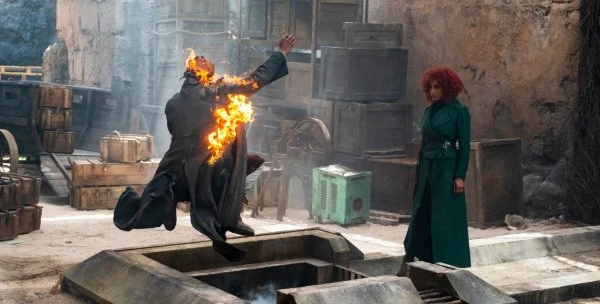
The Watch is colourful, over-the-top, absurd and frequently very funny, an exploration of a bizarre world with inexplicable rules that uses humour for a slanted social satire. This, in itself, is exactly what the Discworld books are about. On the other hand, the sweary, in-your-face punk aesthetic misses the atmosphere of the novels completely, and while the casting is, on the whole, very good and laudably diverse, after a point there are so many changes it seems to barely resemble the source material. Which makes you wonder why they went down this route. Discworld fans have been drawn to it by the link to the books, but have been largely put off by the changes, while those who haven't read the books wouldn't care about the name. Why not make it something entirely new? For at the end of the day, this is a fun, snappy and irreverent comic fantasy that only suffers because of its links to the books it's ostensibly based on. Switch on the show and switch off your inner Pratchett fan, and you'll enjoy it. Go in expecting to see your favourite character faithfully recreated on screen, and you'll be disappointed.
Review: Daniel Tessier
Dan describes himself as a geek. Skinny white guy. Older than he looks. Younger than he feels. Reads, watches, plays and writes. Has been compared to the third, fourth, fifth, sixth, seventh, eighth, tenth, eleventh and twelfth Doctors, and the Dream Lord. Plus Dr. Smith from 'Lost in Space.' He has also had a short story published in Master Pieces: Misadventures in Space and Time a charity anthology about the renegade Time Lord.
Dan's web page can be here: Immaterial
Seen this show? How do you rate it?
Seen this show? How do you rate it?
Published on July 22nd, 2021. Written by Daniel Tessier for Television Heaven.


